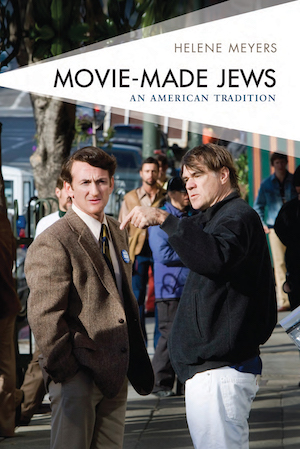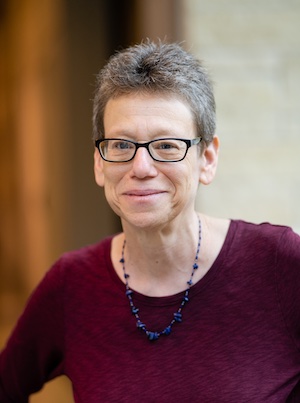By Kaylynne Enloe
Helene Meyers (ΦBK, Pennsylvania State University) excelled in the sciences and humanities as a student, but she followed her calling with literature when she realized she was perfectly content reading War and Peace by Leo Tolstoy in her dorm lounge in the middle of the night. Now she lives her dream of being a scholar-teacher specializing in literary and film studies, feminist and queer studies, and Jewish studies. Meyers is a writer and an English professor at Southwestern University, a liberal arts college in Texas, where she is also a charter member of the Theta of Texas chapter of Phi Beta Kappa.
Film is an effective way to give audiences new perspective and highlight different cultures, beliefs, and values. Meyers emphasizes this point in her newly published book Movie-Made Jews: An American Tradition (Rutgers University Press, 2021) by discussing several fiction and documentary films, such as The Way We Were, Milk, RBG, and Romeo and Juliet in Yiddish. She included chapters organized by theme: anti-Semites and Jews, the Holocaust from a distance, assimilation and its discontents, queer Jews, and cinematic alliances. Meyers elaborated on the meaning of the title stating it referred to how the onscreen characters, directors, actors, and viewers’ understanding of Jewishness is influenced by the production and distribution of these films. Meyers realized while finishing her previous book, Identity Papers: Contemporary Narratives of American Jewishness (State University of New York Press, 2012), that she wanted to expand on American Jewish films, and she discovered the “cinematic tradition is much richer and diverse than generally recognized,” she explained. Hopefully this encourages viewers to take a second look and intently focus on the Jewish characters and storylines in such films.

Meyers’ research shows that accurate cultural representation is diverse representation, which challenges stereotypes, while providing viewers insight into Jewish lives or allowing viewers to identify with the Jewish characters they see on their television screens. The films Meyers discusses in Movie-Made Jews have contributed to healing “communities riven by religious and political fault lines, have affirmed the lives of queer Jews, and have caused viewers and actors to recognize antisemitism previously invisible to them,” she said. Meyers’ mission as a writer is driven by her desire to provide her readers with a new outlook on films they may have seen before and introduce them to remarkable films that deserve more acclamation and recognition for how these movies make Jews. Meyers ensures both the onscreen characters and the audiences who view them play an important role in this influence.
Although Meyers was unable to attend her Phi Beta Kappa induction ceremony, that did not affect her enthusiasm for becoming a Phi Beta Kappa member. “My dad, who was notoriously hard to impress, was incredibly proud of me,” Meyers recalled. She strives to encourage her students to accept their invitation when they have been elected to become a new member, and she makes it her responsibility as a department chair to ensure the budget covers membership fees so her students can celebrate their academic excellence.
Meyers noted that higher education in the liberal arts and sciences shapes lives by creating a healthy democracy, which “depends upon citizens who have wide-ranging knowledge of a diverse world, who make wise decisions supported by facts and credible sources, and who commit themselves to lifelong learning,” she explained. The arts can shape how people view the world by encouraging empathy, originality, and critical thinking. This allows people to become more openminded, rather than sticking to norms that are allegedly true. She positively impacts her students’ lives by teaching a course called “Novel English Majors” that is “part traditional textual criticism and part career coaching,” she said, so they learn to become marketable with their skillset.
Kaylynne Enloe graduated from Arizona State University in 2020 with a Bachelor of Arts in film and media studies, focusing on film genre and the television industry. She was inducted into ASU’s chapter of Phi Beta Kappa, Beta of Arizona, in May 2021.




